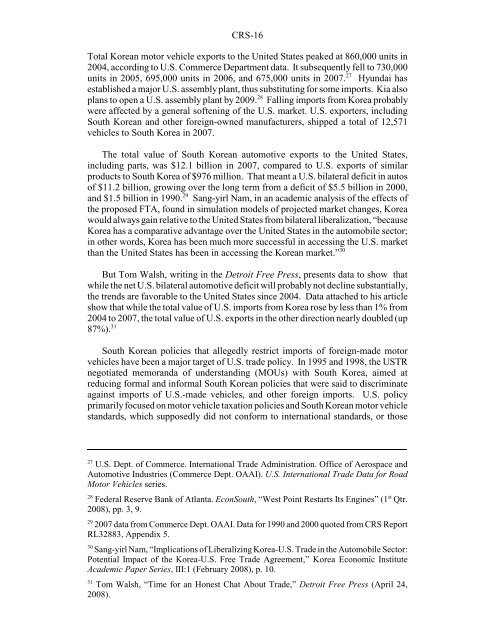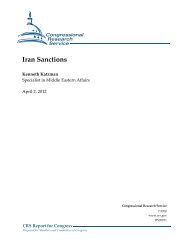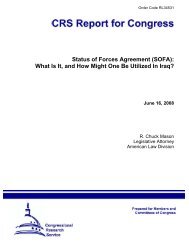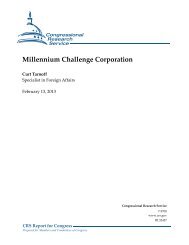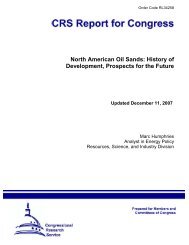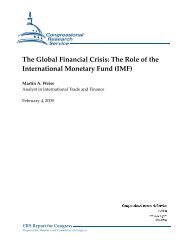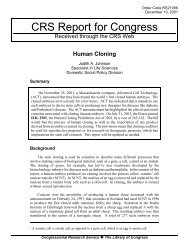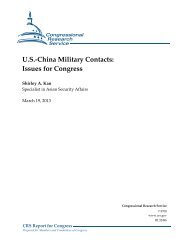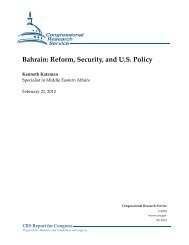The Proposed U.S.-South Korea Free Trade Agreement (KORUS ...
The Proposed U.S.-South Korea Free Trade Agreement (KORUS ...
The Proposed U.S.-South Korea Free Trade Agreement (KORUS ...
- TAGS
- korea
- fpc.state.gov
Create successful ePaper yourself
Turn your PDF publications into a flip-book with our unique Google optimized e-Paper software.
CRS-16<br />
Total <strong>Korea</strong>n motor vehicle exports to the United States peaked at 860,000 units in<br />
2004, according to U.S. Commerce Department data. It subsequently fell to 730,000<br />
units in 2005, 695,000 units in 2006, and 675,000 units in 2007. 27 Hyundai has<br />
established a major U.S. assembly plant, thus substituting for some imports. Kia also<br />
plans to open a U.S. assembly plant by 2009. 28 Falling imports from <strong>Korea</strong> probably<br />
were affected by a general softening of the U.S. market. U.S. exporters, including<br />
<strong>South</strong> <strong>Korea</strong>n and other foreign-owned manufacturers, shipped a total of 12,571<br />
vehicles to <strong>South</strong> <strong>Korea</strong> in 2007.<br />
<strong>The</strong> total value of <strong>South</strong> <strong>Korea</strong>n automotive exports to the United States,<br />
including parts, was $12.1 billion in 2007, compared to U.S. exports of similar<br />
products to <strong>South</strong> <strong>Korea</strong> of $976 million. That meant a U.S. bilateral deficit in autos<br />
of $11.2 billion, growing over the long term from a deficit of $5.5 billion in 2000,<br />
and $1.5 billion in 1990. 29 Sang-yirl Nam, in an academic analysis of the effects of<br />
the proposed FTA, found in simulation models of projected market changes, <strong>Korea</strong><br />
would always gain relative to the United States from bilateral liberalization, “because<br />
<strong>Korea</strong> has a comparative advantage over the United States in the automobile sector;<br />
in other words, <strong>Korea</strong> has been much more successful in accessing the U.S. market<br />
than the United States has been in accessing the <strong>Korea</strong>n market.” 30<br />
But Tom Walsh, writing in the Detroit <strong>Free</strong> Press, presents data to show that<br />
while the net U.S. bilateral automotive deficit will probably not decline substantially,<br />
the trends are favorable to the United States since 2004. Data attached to his article<br />
show that while the total value of U.S. imports from <strong>Korea</strong> rose by less than 1% from<br />
2004 to 2007, the total value of U.S. exports in the other direction nearly doubled (up<br />
87%). 31<br />
<strong>South</strong> <strong>Korea</strong>n policies that allegedly restrict imports of foreign-made motor<br />
vehicles have been a major target of U.S. trade policy. In 1995 and 1998, the USTR<br />
negotiated memoranda of understanding (MOUs) with <strong>South</strong> <strong>Korea</strong>, aimed at<br />
reducing formal and informal <strong>South</strong> <strong>Korea</strong>n policies that were said to discriminate<br />
against imports of U.S.-made vehicles, and other foreign imports. U.S. policy<br />
primarily focused on motor vehicle taxation policies and <strong>South</strong> <strong>Korea</strong>n motor vehicle<br />
standards, which supposedly did not conform to international standards, or those<br />
27 U.S. Dept. of Commerce. International <strong>Trade</strong> Administration. Office of Aerospace and<br />
Automotive Industries (Commerce Dept. OAAI). U.S. International <strong>Trade</strong> Data for Road<br />
Motor Vehicles series.<br />
28 st Federal Reserve Bank of Atlanta. Econ<strong>South</strong>, “West Point Restarts Its Engines” (1 Qtr.<br />
2008), pp. 3, 9.<br />
29 2007 data from Commerce Dept. OAAI. Data for 1990 and 2000 quoted from CRS Report<br />
RL32883, Appendix 5.<br />
30 Sang-yirl Nam, “Implications of Liberalizing <strong>Korea</strong>-U.S. <strong>Trade</strong> in the Automobile Sector:<br />
Potential Impact of the <strong>Korea</strong>-U.S. <strong>Free</strong> <strong>Trade</strong> <strong>Agreement</strong>,” <strong>Korea</strong> Economic Institute<br />
Academic Paper Series, III:1 (February 2008), p. 10.<br />
31 Tom Walsh, “Time for an Honest Chat About <strong>Trade</strong>,” Detroit <strong>Free</strong> Press (April 24,<br />
2008).


